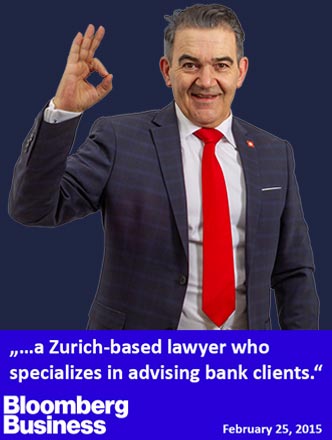Best International Tax Strategies & Tax Planning (Guide 2018)
“The Best International Tax Planning Strategies (Guide 2018) – Discover how to circumvent the Anti-Abuse Legislation of rapacious Tax Agencies of OECD Countries legally.”
If your tax agency considers that your new company abroad has been set up solely to shift profit margins to a controlled entity issuing fictitious invoices, you are under a tremendous risk of being accused of tax evasion and facing jail time.
Discover with the help of our Tax Planning Guide how to structure your business to be tax-compliant and how to legally circumvent the latest anti-abuse legislation of the OECD. Discover with our Tax Strategies how to avoid that your company qualifies as a related “illegal intermediate company” and much more.
Before you are going to set up companies abroad in tax-friendly jurisdictions, you should take the perspective of your tax agency at home to be prepared and win a confrontation with the agency. Our Guide will disclose the latest most common arguments used by rapacious tax agencies of OECD countries.
Experience our battle-proven Tax Strategies, and you will be gratified. Prepare your new company abroad. Plan and draft your Business Plan tax-efficiently. Adapt your new company to be fully tax-compliant with the latest requirements of your tax agency.

Table of Contents – Tax Strategies & Tax Planning
- How your offshore company will survive the tax audit at home?
- How to circumvent Offshore Company Tax Traps?
- What Requirements must be accomplished to pay less Tax to the foreign Company?
- Plausible Economic Reasons
- New Scope of the Company abroad (do not dismantle jobs)
- Choosing the right Company Domicile
- Enough Substance for the Establishment
- Avoid Changes in Supplier Relationships
- Proof of Discharge for related Companies abroad
- Transfer Pricing
- Distribution of Profits of the Company abroad
- Tax Avoidance Examples
1. How your offshore company will survive the tax audit at home?
International tax planning seems to be easy, but it is not. The simple tax-saving models worked without problems for 20 years. Today, wrong tax planning can become a nightmare. Mistakes in setting up offshore companies purchased on the Internet can quickly put you in jail. Setting up tax-optimized structures is like playing with fire – a risky endeavour – not for beginners.
“If you engage the first advisor who popped up from the Internet, you’re already in jail with one foot. Offshore company providers are sellers who need to make sales. They are suffering from tremendous selling pressure because their business is shrinking daily. They are not qualified tax advisors.”
1.1. Offshore Companies and Bank Accounts: how was it like 20 years ago?
The former trust companies controlled by the Swiss banks sold hundreds of such foreign companies every day in the golden age of banking secrecy. When I was employed at UBS, I managed over 120 foreign companies, including offshore companies, in Switzerland. The administration took place only on paper at the domicile of the company in the tax haven in the Caribbean. All administrative work was effectively executed in Switzerland and controlled from Switzerland.
1.2. Wild-West Banking in Switzerland 20 years ago
The customer’s name appeared only on Form A, nowhere else. The identity of the customer was concealed. Nominee shareholders were used as trustee shareholders, nominee directors as directors, and Swiss trustees as authorized signatories to the Offshore Company’s bank account. The customer did not sign any account opening contracts. The trustee signed the agreements with the bank. The beneficial owner of the account did not sign the account opening forms with the bank. The trustee did that for him. The bank accounts of the Offshore Companies have been managed by Swiss banks in Switzerland. For payments from an account of the Offshore Company abroad, the payment slip succinctly stated: “On behalf of a customer”. The foreign bank did not know who sent the money. No banking centre in the world was as safe as the one in Switzerland.
Bearer shares and a watertight banking secrecy protected the customer for decades. The Swiss courts systematically rejected the requests for international legal assistance, the requests for international administrative assistance in tax matters and all the fishing expeditions (group requests) from abroad. The courts protected the clients of Swiss banks for decades – in large numbers and consistently. No chance for the foreign authorities to break the Swiss banking secrecy. The Swiss banking secrecy has been a sacrosanct monument, untouchable for decades.
The Swiss banks at its headquarters at the Bahnhofstrasse in Zurich received on average at least 50 suitcases of money in cash from all over the world – every day. In many cases, the customer did not even leave his hotel to visit the bank. Rather, the bank sent an apprentice to the client’s hotel. He filled a couple of paper bags from the shopping centre full of money in cash. He duly delivered a few of million in cash to the bank at the Bahnhofstrasse in Zurich.
Nobody asked questions. It was daily business as usual. Each meeting room of the bank was equipped with a money counting machine. A cash withdrawal in the amount of the entire account balance was frequently used to break the paper trail from one bank account to the other. In case of a future criminal investigation, it was close to impossible to follow the paper trail.
After a sensitive transaction has been successfully closed, the bank accounts of the involved companies have been closed and the involved companies have been liquidated subsequently. To observe strict confidentiality rules was part of the private banking service mentality of the Swiss bankers. Nobody made questions regarding the client’s tax situation at home. It was not the job of the Swiss bank to verify if the client paid his tax bills at home – as it is today.
On the same day, bank accounts were opened in the name of Offshore Companies. The client got a list of 50 good-sounding fantasy names from offshore companies in the morning and chose a name. In the afternoon, the account of the Offshore Company was already operative.
The beneficial owner was not obliged to leave his signature to the bank, as the bank account records were signed by the Offshore Company, the nominee directors. The account opening documentation has been kept without a signature of the beneficial owner. Trustees signed the agreements with the Swiss banks – never the beneficial owner. The beneficial owner’s identity has been protected by the strong Swiss bank secrecy.
To protect the ultimate beneficial owner, even more, so-called corporate nominee directors were used as representatives of the offshore company. This only works in offshore jurisdictions, where the representatives of legal entities are again legal entities. In continental European legal systems, organs must necessarily be natural persons. On the other hand, in Anglo-Saxon offshore legal systems, a director of a company can be a company acting as a corporate director. Corporate directors have been frequently used to protect the names of trustees and to reduce the liability risks substantially. This allowed the use of a supplementary barrier to protect the identity of the ultimate beneficial owner.
The customer did not sign the account opening documents and neither the securities deposit agreement with the Swiss bank. Rather, it was the Swiss Trustee who signed the bank account opening forms by virtue of its capacity acting as a legal representative of the Offshore Company. The Beneficial Owner never left his signature on bank account opening forms. Absolute confidentiality was part of the business model of Swiss banks. He was shielded and fully protected.
1.3. Form A was invented in 1977
Form A for determining the beneficial owner: http://www.polyreg.ch/d/formulare/formular-a.pdf
After the Chiasso scandal of 1977 who involved the Swiss Kreditanstalt, today knew as Credit Suisse, the Swiss Bankers Association
Swiss Bankers Association: http://www.swissbanking.org/en
Invented and introduced the Form A for client identification. On Form A, the contracting party of the Swiss bank is obliged to establish the identity of the Beneficial Owner. The Beneficial Owner is the ultimate economic owner of the assets despite the legal construction based on structures with companies. At that time, black money from Italy in the number of billions of dollars flowed over Chiasso to Liechtenstein. On the famous Form A, the Offshore Company’s legal representative established the Identify of the Beneficial Owner. He had to confirm that he had personally identified the customer by means of a passport and noted his name, address, year of birth and nationality on the Form A. That’s it. However, until these new regulations were put into practice, years passed. According to my professional experience, I can confirm that many bank accounts without a Form A were managed still during the 1990s.
Well understood: these are bank accounts, without the bank knew the identity of the end client, the beneficial owner.
The Swiss banks achieved record profits year by year. The bank charges were set high. Nobody protested. The customer was happy to save taxes and secure his funds. The number of expenses and a good performance were not critical to the client, as is the case today.
No question: Swiss banking secrecy was more solid than the Berlin Wall.
In 1997, the Swiss Bank Corporation merged with the old UBS (in German: SBG). The mega-merger created today’s UBS. Immediately after the merger, UBS sold the trust companies to protect the reputation of the bank. The UBS Group managed more than 100,000 offshore companies. The merger started the beginning of the slow end of the offshore industry. Today, it’s very difficult to open a bank account in the name of an offshore company with a Swiss bank.
1.4. Legal or Illegal – A moving Target!
Genuine legal business practices have been criticized by the OECD countries. Switzerland has been forced by the OECD to introduce new domestic laws making legal business practices illegal. If a Swiss company paid some money to an officer in Pakistan to help with the paperwork for the importation of goods to Pakistan, it was legal to deduct the payment to the officer for tax purposes. Today, the same event with the same payment is considered corruption of foreign officials and international money laundering activities. Some basic business activities have become illegal.
In Seychelles, such an offshore account opening may still work. But how do you get your money back from Seychelles where you need it and spend it? – Mission Impossible!
1.5. Attention! – Do not copy!
The tax saving models described here are history. They cannot be taken over today. They are too good and too simple to be true nowadays. We strongly advise against plunging into an adventure with an offshore company purchased on the internet. It’s not that easy anymore. Be careful. Do not copy simple structures. At best, difficulties with the tax agency are inevitable. In the worst case, you end up in jail.
2. How to circumvent Offshore Company Tax Traps?
The point of view of the tax agency: stumbling blocks and tax traps
2.1. Related Companies
The foreign company is attributed to you and classified as a “related company” to you. Stringent requirements and far-reaching disclosure requirements are the results. Invoices from abroad are not recognized. Such invoices are qualified as fictitious invoices.
2.2. Illegal Intermediate Company
If the tax agency considers that the company abroad has been set up solely to evade taxes, this company qualifies as an “illegal intermediate company”. The tax agency could check whether the offence of tax evasion is fulfilled.
If you use purchasing and sales companies to shift the profit margin with the help of a related company with a large part of your sales, then these too are qualified as illegal intermediate companies.
2.3. Fictitious Bills
Invoices from foreign companies must be priced as high as if a foreign company had issued an invoice. International tax law refers to the “at arm’s length” principle. The invoices have to survive the comparison test with third parties. For each invoice, a corresponding service or product must be provided at objective market terms and conditions, otherwise, such invoices are qualified as fictitious invoices.
2.4. Transfer of Functions
If certain functions such as market research, development and marketing are shifted to low-tax foreign countries, the tax agency could assume a transfer of functions. A shift in function could be interpreted by the tax agency as an illegal tax evasion. Watch out.
2.5. No Substance in the Company (No Establishment)
If your company does not have any substance abroad (own office space, own personnel, for which social security contributions are effectively paid abroad) and if the most important decisions of the management of the foreign company are not made abroad, then the establishment of the company is not abroad, but rather at your home. The tax office taxed the foreign company as if this would be domestically.
2.6. OECD – BEPS (Base Erosion Profit Shifting)
In October 2015, the OECD adopted the BEPS Guidelines on Combating Profit Reductions with Base Erosion and Profit Shifting. Companies like Google, Apple and Amazon have optimized huge profits for tax purposes and massively saved taxes. With that OECD BEPS Rules, a whole series of tax-saving strategies will fall into the water.
BEPS has not yet been transposed into the national laws of the signatory states. However, an international trend of all European tax authorities is already emerging. Governments want to prevent profits from being easily shifted to low tax countries.
3. What Requirements must be accomplished to pay less Tax to the foreign Company?
Invoices from your foreign company to your domestic company at home can reduce your company’s profits in a high-tax country (Germany, France, Italy, Denmark, Spain, etc.). The profit is shifted abroad to tax-efficient jurisdictions, where there is a low tax.
The tax agency will be alerted. It will make sure that all requirements are met so that the transfer of the registered office abroad is based on plausible economic reasons. These are tax strategies for high-income earners. If you do not want problems, then you must pay attention to the following requirements:
- Consider the CFC Rules on the Foreign Tax Law (Controlled Foreign Corporation Rules)
- Pay attention to the transfer pricing rules
3.1. Plausible Economic Reasons
Before you set up a company abroad, you must have good business arguments. Tax reasons alone are not enough to justify a new foreign company set-up abroad. Rather, you need plausible arguments that make economic sense, so that you succeed in the proof of discharge with the tax agency (offering evidence of exculpation).
If you relocate a financial company in the area of crypto-currencies in the City and Canton of Zug, this seems plausible. Everyone knows that the City of Zug in the Canton of Zug is called Crypto Valley. Everyone knows that Zug offers the best economic environment in the world for the crypto industry. This is a plausible economic reason for choosing a location in Zug. If you are involved with Crypto Finance your Tax Planning 2018 means to relocate your company to Zug, Switzerland.
If you work in the watch industry or in the chemical industry, then it is obvious that you are opening a company in Switzerland. If you earn money with online games, then it is obvious that you start a business in Malta or Gibraltar. Gibraltar and Malta are well-known in the online gaming industry. If you have goods made in Shenzhen, China, it makes sense to have a company in Hong Kong that controls these goods.
If you work in the tourism industry, it is economically plausible, if you start a business in the Bahamas.
Almost always good economic reasons can be found so that a company abroad can also be made economically plausible. The answers must be well prepared. The tax agency will ask questions. The best possible answer should be fine-tuned with your tax adviser. It has to come out of the pipe, without leaving any doubt open.
3.2. New Scope of the Company abroad (do not dismantle jobs)
What scope should the company have abroad? Classic outsourcing services such as marketing, financial accounting and public relations are not suitable as a scope for the foreign company. The tax agency could come up you terminate the contracts with the local companies dismantling jobs. The much better tax planning strategy is you opt for completely new activities to move abroad in a new country.
You have apps for the iPhone developed overseas, where workers are less expensive and have more experience with it. The foreign company sells all products to your company. Your company only serves the domestic market. You need a new company abroad to prepare the distribution of products abroad.
3.3. Choosing the right Company Domicile
We recommend a state in the EU (Malta, Cyprus, Ireland) or a state, such as Switzerland, which has signed agreements with the EU on freedom of movement and freedom of establishment. Freedom of establishment is a constitutional right which, as a higher right, breaks (derogates) and invalidates the hierarchically lower domestic law of the individual states. Nobody may restrict the freedom of establishment or prohibit it altogether. Even the tax agency is not. The right of establishment protects the investor. Decrees of the tax agency, which make the freedom of establishment more difficult, are invalid and unconstitutional.
Constitutional law breaks (derogates) normal law (tax law is a normal law)
The Roman legal state law applies: “Lex superior derogat legi inferiori”
The higher-ranking constitutional law breaks the lower tax law.
The constitutional right to freedom of establishment offers a certain shielding effect. Lower-tier tax law must not call into question higher-ranking constitutional law. No authority may question the freedom of establishment. It may not question the domicile of the company abroad or otherwise, hinder it. Of course, the structure may be examined and questioned. You can rest assured that this will happen. The EU’s traditional low-tax countries are Malta, Ireland and Cyprus.
3.4. Enough Substance for the Establishment
The company abroad must have enough substance. Otherwise, the war is already lost at the beginning. Own premises, own staff and local management are mandatory requirements that you must meet. Otherwise, the tax agency assumes that the permanent establishment is where you are. If your company has no substance abroad, it is considered non-existent. It is simply not recognized as a company with legal personality.
There must be no fiduciary relationships abroad. A managing director who earns a market-standard salary of at least EUR 2’500 net is indispensable. Solutions with Virtual Office do not work. The tax agency will verify if social security contributions have been paid abroad. It checks whether people have actually been hired.
You must prepare all arguments in advance and document accordingly. You have a legal obligation to cooperate with questions from the authorities – never forget that. The answers must come out of the pipe and hit the mark. At the question of substance, the authorities are very strict. Prepare yourself. You cannot leave anything to chance here.
3.5. Avoid Changes in Supplier Relationships
If at one point the foreign company delivers a product which another supplier has previously delivered at a much lower price, questions may come from the tax agency.
Tax Planning Definition & Tax Planning Examples
Your company has been buying the same product for EUR 1’000 in Shenzhen in China for three years. Suddenly the business relationship with China ends and your company buys the same product from your foreign company at a price of EUR 1’500.
Of course, we will help you. We always find an explanation for you. However, the declaration must appear economically plausible (example: insolvency of the supplier). However, it is much more advantageous if the suppliers remain. The foreign company should only buy new products and concentrate on new suppliers who also supply new products.
Tax Planning is a combination of planning your business in compliance with tax avoidance and tax optimization. Combine your international tax avoidance, tax optimization and tax planning with the economic planning of your business. If you combine your tax avoidance strategies with your business plan, you will never run out of plausible arguments for the tax agency. That’s efficient tax planning.
3.6. Proof of Discharge for related Companies abroad
Since the foreign company is obviously a related legal entity, it is also obvious that the tax authorities always suspect that it is a tax structure with the purpose of shifting profits in a low-tax country.
Therefore, you must be prepared so that you can relieve yourself without effort and produce the evidence of exculpation without having problems. You should be prepared. You must be able to document that the purpose of the foreign company is quite different from shifting profits.
Think about the economic reasons. You need solid economic arguments to justify the new company domicile abroad. Above all, the substance of your foreign company must be immediately shown without hesitation (leases, social security bills, electricity bills, etc.). The invoiced prices must withstand a third comparison (“at arm’s length”). How much would your company have to pay in the market and how much does the company pay abroad?
3.7. Transfer Pricing
Market-based billing (invoicing) of your foreign company for services rendered or for the delivery of products must pass the test with a third-party comparison. The authorities are very sensitive to transfer pricing. You must be prepared for an early exam.
Rule of thumb:
Prices may not be higher than the prices of local suppliers at the headquarters of your company at home.
So that you have no problems with the tax agency at home, your transfer prices must be lower than comparable prices on the market. The tax authorities would like to point out that the foreign company does not have to work on the order and does not have to bear any acquisition costs. Therefore, this advantage must also affect the pricing.
In practice, however, we always find solutions and arguments. There are no limits to the imagination, as long as one knows the economic background. Who can estimate whether 100 hours or 200 have been spent on an app development?
3.8. Distribution of Profits of the Company abroad
Your foreign company first pays the taxes abroad and then pays out the profits. You indicate the profit distribution and pay a capital gains tax.
More tax efficient, however, you are reinvesting the profits (no profit distribution) and invest in further projects. Retaining profits means not distributing profits, but increasing profits for the company.
Do whatever you like with it. You can invest in real estate or pay off loans. You save the profits and do not pay until you later move to Switzerland or Italy. If you move to Italy with the new Golden Visa Italy program, you only pay EUR 100’000 flat rate tax. All profits from abroad are tax-free.
Don’t blindly follow the advice of the big bank’s advisors.
I have seen significant losses in the millions of dollars and hidden fees that have destroyed many assets of wealthy entrepreneurs.
Be smart and learn from other millionaires’ mistakes.
Speak to Mr. Enzo Caputo today and let us analyze your situation.
4. Tax Avoidance Examples
Save 5 million euros in taxes by moving to Italy
If you are resident in Germany and receive 10 million euros of profit from your company in Germany in the form of distributed dividends, you will have to pay the approximately 5 million euros as income tax to Germany. If you do not distribute the profits in Germany and accumulate, you pay no income taxes. You transfer your residence to Italy with the Golden Visa Italy program. Thanks to your new Non-Dom Tax Status, your income generated outside of Italy will remain 100% tax-free. You can distribute your 10 million dividends only after you have moved to Italy. This will legally save you 5 million taxes. You pay only the lump-sum tax of EUR 100’000.
Tax savings of EUR 48 million through tax optimization in Switzerland
When Formula 1 pilot Michael Schumacher relocated to Switzerland (Gland VD), he realized an annual income of EUR 100 million. He had himself taxed in Switzerland on a flat-rate basis. In Switzerland, he agreed on a flat tax of only CHF 2’000’000 per year. Whoever earns so much in Germany, easily pays half of it in taxes (about 50 million EUR income tax). He was able to save EUR 48 million in taxes by moving to Switzerland.
In addition to Michael Schumacher, other Formula 1 racers have relocated to Switzerland based on the lump-sum taxation scheme: Alain Prost, Jackie Stewart, Bernie Ecclestone, Sebastian Vettel, Kimi Raikkonen. The income is not taxed, as you might think. The income does not interest the Swiss. Rather, the cost of living is the determining factor for taxation. The cost of living will be multiplied by a factor of 7.
“The flat rate taxation in Switzerland is based on the number of helicopters and racehorses the taxpayer owns. Financial income has no impact.”
At the end of 2016, all financial directors of the Swiss cantons met at the finance director conference. At the end of 2016, they discovered that 5046 flat-rate millionaires live in Switzerland.
There are many constellations on how to save taxes with a foreign company. Every case has its own characteristics. The examples presented here serve only to illustrate complex facts. Under no circumstances should you copy our examples. Each case is stored differently. Call us if you would like to discuss a specific case with us. We are happy to discuss your case with you and give our opinion. We always have ideas in stock that work in practice. We always strive to update our knowledge.
Surveys prove:
“Business success is based on professional advice!”
- Before you plunge into expensive financial adventures with bad investments abroad, call us.
- We define with you the exact economic scope of your foreign company before you start to invest.
- We help you to calculate when a new company pays off abroad.
- We help you drafting a business plan (also for the tax office)
- Thanks to decades of professional experience with Swiss banks, trustees, family offices, we are very familiar with the needs and expectations of international private clients. We’ve built a worldwide network of relationships with the best experts in the world, which is priceless. From now on, you benefit from this network when you work with us.
- We think and we work international – across borders, time zones, language barriers and cultures.
- We have clients from Sicily to Lapland, from Lisbon to Shanghai, from Istanbul to Muscat, from Ushuaia to Anchorage, from Mumbai to Port Moresby.
Send us an email. Book an appointment with our International Tax Attorney Enzo Caputo.
Remember, it’s never too early for a consultation, but often too late.




